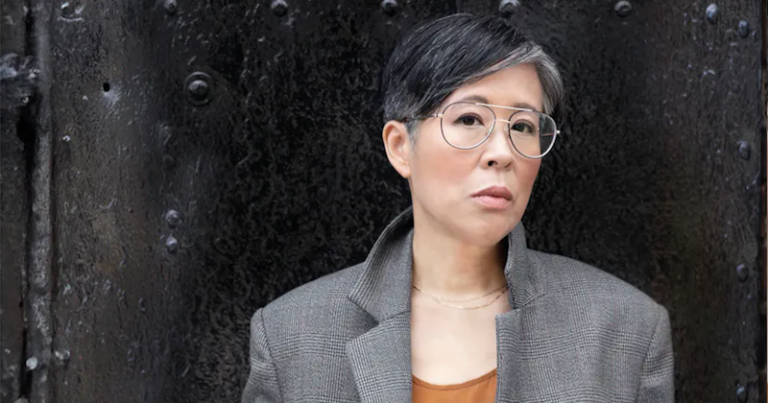By Kazuo Robinson.

Gillian Linden, Negative Space (W. W. Norton & Company, 2024).
The setting is New York, some time after the lockdowns. Our nameless narrator is a mother, a teacher, a worrier, and a whistleblower. (She is married, but she’s not much of a wife, just as the man she’s married to is not much of a husband.) In the mornings she showers, dresses, and feeds the two tykes, Jane and Lewis. Then she drops them off at their schools, and goes to her own, where she teaches English to sixth and ninth graders. Some students are Zooming in, and everyone else is meant to be masking. She worries about the processed meats Jane and Lewis seem to prefer, the hint of suicidal ideation in a student’s class contribution, how to teach Shakespeare to sensitive eleven-year-olds — then more immediate things actually go wrong: she feels faint, then faints; Jane has infected gums; a teacher, her boss, gets too touchy with a student, and this must be reported to the faculty advisor.
Linden, with a short story collection titled Remember How I Told You I Loved You? ten years behind her, has delivered a vexing debut novel, one well short of two hundred pages. The story takes six days and the six chapters are titled accordingly, so Negative Space has the compressed feeling of a novella, but it has rather a lot of characters for its length, mostly colleagues at the private school where the narrator teaches, and you could also think of it as a novel’s skeleton with the flesh of backstory, digression, and subplot removed. Scenes are short, and sentences spare, with few adjectives and very few adverbs. (As a side question for those interested, if everything that happens in a chapter happens on the Monday, is the chapter title “Monday” a kind of magical adverb that modifies every sentence?) “Negative Space” is the name of the school’s literary journal — it’s a very fancy school — is it also the space around the denuded bones, asking to be filled with the keen reader’s imaginings, or the contributions of the humble literary critic?
There are other questions to be asked, as for instance what Linden is going for in her bureaucratic scenes, a confab with Robin about the possible misconduct by Jeremy, the older teacher, then a more formal meeting with Robin and Tonya of Human Resources. These are subtly styled, with initially plausible dialogue and manners, followed by the beginnings of a Seinfeldian discourse on the difference between a “nudge” and a “bump” (while the narrator harbors the more accurate “nuzzle”), and Robin’s odd, unprofessional impertinence which might remind readers of office functionaries from early Evelyn Waugh (Scoop or Vile Bodies). There are hints of nightmare or dystopia here, something other than just light satire. Linden has her cultural targets set out, like the school’s requirement that its teachers write “narratives” that gently explain why Jasper or Olivia got a B minus, or the parents’ specialized claims that Aria has a perfect memory or that Louisa is “unimaginative in a clinical sense”, but it seems there is something different and disquieting going on, something beyond the affluent folly, the COVID or the curriculum wars.
Or it may be that the narrator is just confused. More disjointed than the office scenes are those in the classroom with her sixth graders, which are near chaotic. This teacher is all for a healthy critical approach to Kafka, Shakespeare, and all the rest of the deceased Caucasian gentlemen, but, as she explains to a not particularly supportive husband Nicholas, teaching only works if the students listen to her. Here they are getting started on A Midsummer Night’s Dream:
“I was hoping we’d get new books,” Jasper said.
Aurora said, “Mine is falling apart.”
“What the physical book looks like doesn’t matter,” I said.
“It’s so hot here today,” Lily said. “Can I have a hallway break?”
“Go ahead,” I said.
Harlow said, “I found something sexist on page 45.”
Funny, but these passages are frustrating too, with their childish interruptive demands. One doesn’t know if Linden intends this irritation, but it’s distinctive, this contact of the reader’s mind with a bit of rough texture. When her narrator gets home, her own two children aren’t any easier to wrangle, and the chatter can be yet more confounding. Jane murmurs that “this world is made out of mysteries”, her mother asks her what she said, and she explains that it’s something she got from a TV show featuring a cartoon otter. What intrigues most in Negative Space is the way the clearly ordered days of the week structure, with its reliable repetitions, contains such disorder, and that although the narrator is made uneasy by disruption, routine is little comfort. Nicholas is usually late to the marital bed, delayed by Zoom meetings, and she has to unplug his earphone to talk to him. He might ask about her headache or agree with her about Jeremy, but it’s not enough, and his preoccupation with whatever is on his phone maddens her.
The narrator has an awkward walk and talk with Jeremy in which her anecdote plays on routine and disruption. After a little fun with prepositions, she delivers an impeccably worded joke-cum-flash fiction.
“Once I stepped in a rat.”
“What?”
“I stepped in a rat that had been run over by a car. Fortunately, I was on my way to therapy.”
If only our standup comedians were this pithy. This is irony, serendipity, their interaction, and an implied question: can a therapist really help dispel the image of a raw rat scallopine?
Two paths for Gillian Linden. One would have a lot more of this overt comedy, the slapstick and grotesque applied to things “relatable” for a New York millennial readership, things like rats and therapy (settling for this would be no shame, and the reviewers will bestow laurels like “mordant” and “caustic”.) This satire would still need some topical objects to reassure people that it is not just fun but “incisive”. Two, much trickier, would be finding a way to embed this kind of thing into the plot. As it is, it sticks out because it is pithily ambiguous, but what if an entire story could be built on this kind of juxtaposition? That scenario, or another that offers a comic play between incident and the quotidian, could be expanded into a novel of similarly compressed time, and it could be something less topical, more suggestive, and possibly more enduring than Negative Space’s he said she said, COVID aftermath plot. (You can think of relevance as starting from a metathetic messing up of revelation, and you can know that it is cognate with relief, that it is a kind of therapy, a quick fix.) The moment when the reader gets such an elaborate joke is a jolt, remembered long after the news has grown old. The whole book comes alive, the way Portnoy’s Complaint does at the very end with its punchline. Talk about a zinger! The analyst wants to get started, there’s so much more to say, and the ending is really a beginning. If Linden took the second path and went with the rat and therapy idea, her last line would be already written, and it would go right out to the reader: “And how did that make you feel?”

ABOUT THE AUTHOR
Kazuo Robinson is a writer based in New York. His reviews of fiction have appeared in Cleveland Review of Books, The Oxonian Review, and Chicago Review of Books.












 Bengali (Bangladesh) ·
Bengali (Bangladesh) ·  English (United States) ·
English (United States) ·